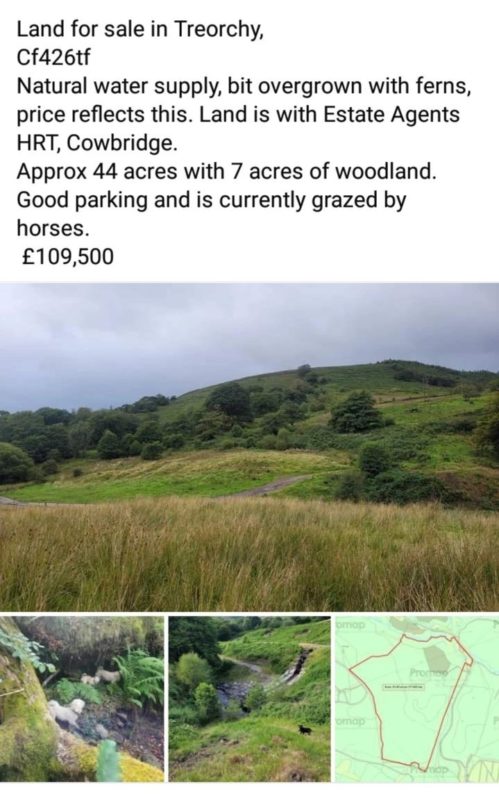
Ken Moon, Founder of Tir Pontypridd
A recent post highlighting some relatively un-preposing farm-land for sale in Treochy, the Rhondda Valley, South Wales saw a huge surge of interest on the Land for sustainable development in Wales – including OPD group this week.
The post was shared from the group around 30 times and saw dozens of new people join in a matter of hours.
There wasn’t anything of particular merit or interest about the listing that set it apart as being in any way special, but for some reason it caught people’s imagination.
The post included the usual useful information about the land including that it is 44 acres of grazing with seven acres of woodland and has its own natural water supply. But that it is “a bit overgrown with ferns”, hence the price.
The listing was advertised with estate agents HRT, Cowbridge and priced at £109,500.
Interest
Despite some members of the group commenting on the steepness of the land, its poor quality, the relatively high price of the land for the average person, and the clawback clause included in the sale particulars, the interest in this sale stood out in what had otherwise been a relatively quiet week of Facebook group administration.

According to Farmers Weekly, the average price per acre for average quality pastural farmland in Wales in 2021 was £5,500.
For poorer quality land it was around £3,850.
Land prices are thought to have gone up considerably since lockdown. So, I can understand why those looking for poor-quality grazing land might be interested in the sale.
Implications
As an admin of the Facebook group I also find it reassuring to see that so many people are interested in securing land on which they can live sustainably in Cymru.
That in itself is a good thing. However, as someone who also lives and works in Cymru, and in the Rhondda specifically, there are also some concerning implications.
Firstly, not everyone who lives and farms in this area has the money to invest in land on the open market. And securing finance, especially for low quality pastural farmland isn’t straight-forward and can take time to arrange.
If a significant number of people taking an interest in this sale are not from the area then there is a risk that members of the existing farming community, and others living locally who might be interested in starting out in farming, may find themselves priced out of the market.
Sales of farmland on the open market tend to favour those from more affluent areas of the UK, those who statistically have more disposable income to invest. Those looking to buy land to explore their individual or family dreams of sustainability.
Such sales also favour large corporations looking for opportunities for commercial carbon offsets, or national and international investors looking to increase their property portfolios.
This isn’t a criticism per se, it is simply how the free market works. A market in which land has become a tradable international commodity of rapidly inflating financial value, rather than an asset of inherent value to the local economy, community and nature.
Clawback
Secondly, as with this sale, landowners are increasingly including a ‘clawback clause’ in their sales of land.
Clawback clauses can sometimes be included for good reasons, where land is under development pressures they can help put off potential developers from keeping land for the farming it has traditionally been used for.
However, clawback clauses can also be a means by which a seller of land can earn additional income, long after a sale, from any development of the land which increases its value.
This can include developments such as housing but can also be something as simple as putting in a stable block, and thereby increasing the value of the land.
Taken together this sale of land on what is an international market, and the inclusion of clawback clauses can act as significant barriers to local farming, rural and urban communities from being able to raise the capital needed to purchase land that comes up on the open market that might benefit the local economy, community and nature.
Land reform
In Scotland, a series of Land Reform Acts since 2003 have given communities the right to buy land at a fair valuation. Later adjustments to this legislation now mean that communities in Scotland not only get the right of first refusal with any land that comes to the market, but communities in Scotland can now compel landowners there to sell underused land for the purposes of community led sustainable development.
No such legislation exists here in Cymru. Yet without a strong policy framework to ensure that existing communities have a strong voice over what happens with land around where they live, then ownership of that land is the only way to guarantee that voice is in the vanguard of that decision-making.
Just down the valley from where this sale of land is taking place the community of Pontypridd is setting out on its own long-term journey to secure the land around the town for community benefit and nature.
Tir Pontypridd is painfully conscious that it is doing so in the context of a ‘free market’ for land and will therefore start out by looking for landowners who are happy to work with their local community.
In doing so Tir Pontypridd is also working with others across Cymru to develop and implement a Land Reform Act Cymru.
Reform that will help to shift the balance of power away from the free market and, corporations and international investors back into the hands of local communities of the farmers, hamlets, villages, towns and cities of Cymru.
On Saturday the 24th August the Chair of Tir Pontypridd, Ken Moon will be chairing The Big Debate at this years Between the Trees Festival 2024.
The debate will be exploring the ‘the Future of Land Use’ with Abi Reader, livestock famer & NFU Cymru deputy president; Carwyn Graves, academic & author; & Simon Wright, food writer, broadcaster & emporium owner.
Will some form of Land Reform Act Cymru form part of this debate? Come and find out.
Support our Nation today
For the price of a cup of coffee a month you can help us create an
independent, not-for-profit, national news service for the people of Wales, by
the people of Wales.







